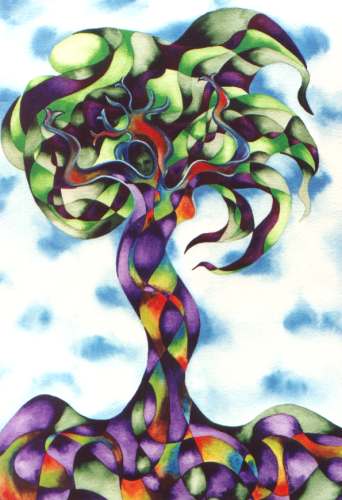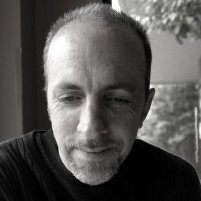|
7/29/2011 Comments On Christian AnimismBy: Ric Hudgens  Animism was practiced before it was “believed in”. Human beings living life immersed in a living world of “other” voices is a universal phenomenon found in every indigenous culture. By “indigenous” please understand that I mean the dominant worldview of the majority of human beings for the majority of our time on this planet. Animism is our native belief. Sir Edward Tylor, the founder of the “science” of anthropology, was the first to give a formal, academic (and pejorative) definition of “animism”. Tylor defined animism as “an idea of pervading life and will in nature.” Writing in 1871 in his tellingly titled magnum opus Primitive Culture, Tylor asserted that this naïve idea was a childish and underdeveloped stage in human development common only among primitive hunter-gatherers. A century later psychologist Jean Piaget proposed that the ability to distinguish the animate from the inanimate was the inevitable product of education and learning. The consensus of the great Western intellectual tradition has been that the majority of human beings for the majority of human history have been fundamentally and tragically mistaken about the world in which they lived. It is not a coincidence that the academic disparagement of “animism” as the primitive belief of primitive peoples arose simultaneous with the rise of industrial and technological civilization. Before nature can be bound it must be gagged. The world must be silenced so that only the human voice can be heard; and only the human will can dominate. In 1997 philosopher David Abram wrote The Spell of the Sensuous, a sophisticated philosophical work that questioned this Western prejudice against animism. Abram drew upon a broad survey of oral, indigenous societies, weaving these insights together with the phenomenological philosophical work of Maurice Merleau-Ponty and Martin Heidegger. Abram’s first book and it’s recent sequel Becoming Animal (2010) should become foundational reading for anyone concerned with life on this planet: human and (in Abram’s wonderful phrase) “more-than-human”. Abram deconstructs the Western philosophical tradition prior to Descartes (now a standard philosophical whipping boy) back to Plato and Socrates, the wellspring itself. Abram’s insightful conjunction of Merleau-Ponty’s work on perception and embodiment with indigenous stories and myths often labeled “animist” is an eye-opening, ear-opening, sense-awakening tour-de-force. Many who have read it can testify that unlike most books it can actually change the way one experiences the sensual world. Abram presents a compelling argument that even human understandings of time and space are rooted in our experience of the physical earth. Past, present, and future are literally connected with things “beyond the horizon” and “underneath the ground”. Time and space are not conceptual categories we impose upon the world. We derive them from our experience of living on this planet, moving across its surfaces, experiencing death and decay back into the earth. From this perspective time and space begin to lose their distinctiveness and blur into “time-space” which is not a category or a structure, but a perspective upon life itself. What Abram does not address in detail is that modern conceptions of time and space arise as part of the industrial-technological project of gagging and binding nature under the domination of humanity. Isaac Newton’s “discovery” (i.e. invention) of absolute time and absolute space was foundational to humanity’s technological dominance and denuding of the more-than-human world. Even western cosmology has had an imperial agenda. Christianity’s involvement in, support for, and defense of these developments cannot be doubted. One can argue that such a history is not in continuity with the biblical sources or even the divine intention. One can also argue that there have always been dissenting voices in Christian history questioning, protesting, and sometimes resisting these developments. However, the condemnation of Christianity as a willing accomplice in the gagging and binding of the planet cannot be questioned. To thoroughly hear and be convinced by Abram’s arguments is to become self-conscious of our sensual withdrawal from the world around us. We have created cultural and societal practices (primarily through our use of technology) that reinforce this separation. The French surrealist writer Rene Daumal wrote that “we must first become human before we can become anything superior.”[1.From a letter Daumal wrote to a friend and quoted by Roger Shattuck in the introduction to Daumal’s Mount Analogue: A Novel of Symbolically Authentic Non-Euclidian Adventures in Mountain Climbing (Penguin, 1974)] Abram’s work raises profound questions about our ability to achieve even this basic level of life: becoming human. In the modern world we have in fact become less than human, less than we used to be, less than we were meant to be. Surely, when the Jesus of the Gospel of John (John 10:10) says that he came to bring life and to bring it abundantly he meant something quite different from what we see in our society today. When we gag and bind the more-than-human world we gag and bind ourselves. We gag and bind the God who created all of it. I am not convinced that “animism” is alien to the biblical tradition. Nor am I convinced that the arguments of David Abram cannot be incorporated into a “Christian animist” perspective. The promise in this perspective is that the more-than-human world would once again enfold the human world; and the human find it’s essential place within the more-than-human. The ungagging and unbinding of the more-than-human world would not necessarily be a simpler world. Including more voices is always complicating. But perhaps we are not called to live a simpler life but a more complex life.[1] Perhaps we are called to live lives that listen and hear once again the more-than-human world which has never stopped speaking in spite of our self-willed deafness. One theologian who has been exploring the shape of a new “Christian animism” is Mark Wallace. In two recent books Finding God in the Singing River: Christianity, Spirit, Nature (2005) and Green Christianity (2010), Wallace has begun to outline the biblical and theological ligaments of this perspective. Wallace is trying to rethink the Christian faith as an earth-based religion. Our Christian faith should celebrate the bodily, material world as the place of God’s indwelling and care. Christian animism is the belief that all of creation is filled with and animated by God’s presence. The animist worldviews of first world peoples may not be fundamentally opposed to classical Christianity. Christian animism affirms God incarnate in human flesh in a “green Jesus” and incarnate in creation by a “carnal Spirit” who indwells both human and more-than-human. Wallace points out that the Bible and the Christian tradition possess rich images and stories about God as an “earthen” being (God in the wind, the water, the fire). And perhaps when the Psalmist proclaims creation as declaring God’s glory and singing God’s praises it is not being metaphorical! The complementarity of the philosophical work of David Abram and the theological work of Mark Wallace provide the possibility for some new trajectories in radical Christian praxis. Native American writer Charles Eastman (also known as Ohiyesa) wrote in his autobiography The Soul of the Indian(1910) that “Christianity and modern civilization are opposed and irreconcilable, and that the spirit of Christianity and of our ancient religion is essentially the same.”[3. Page 10 (Dover Publications, 2003)] Perhaps it is not Christianity and animism that are natural enemies. Perhaps Christianity is the enemy of the civilization that has gagged and bound the voice of God, incarnate and alive within the entire, living, animate, inspirited world that God created. Notes
Comments
|
Disclaimer
The viewpoints expressed in each reader-submitted article are the authors own, and not an “official Jesus Radicals” position. For more on our editorial policies, visit our submissions page. If you want to contact an author or you have questions, suggestions, or concerns, please contact us. CategoriesAll Accountability Advent Anarchism Animal Liberation Anthropocentrism Appropriation Biblical Exegesis Book Reviews Bread Capitalism Catholic Worker Christmas Civilization Community Complicity Confessing Cultural Hegemony Decolonization Direct Action Easter Economics Feminism Heteropatriarchy Immigration Imperialism Intersectionality Jesus Justice Lent Liberation Theology Love Mutual Liberation Nation-state Nonviolence Occupy Othering Pacifisim Peace Pedagogies Of Liberation Police Privilege Property Queer Racism Resistance Resurrection Sexuality Solidarity Speciesism Spiritual Practices Technology Temptation Veganism Violence War What We're Reading On . . . White Supremacy Zionism ContributorsNekeisha Alayna Alexis
Amaryah Armstrong Autumn Brown HH Brownsmith Jarrod Cochran Chelsea Collonge Keith Hebden Ric Hudgens Liza Minno Bloom Jocelyn Perry Eda Ruhiye Uca Joanna Shenk Nichola Torbett Mark VanSteenwyk Gregory Williams Archives
October 2017
|
Search by typing & pressing enter


 RSS Feed
RSS Feed